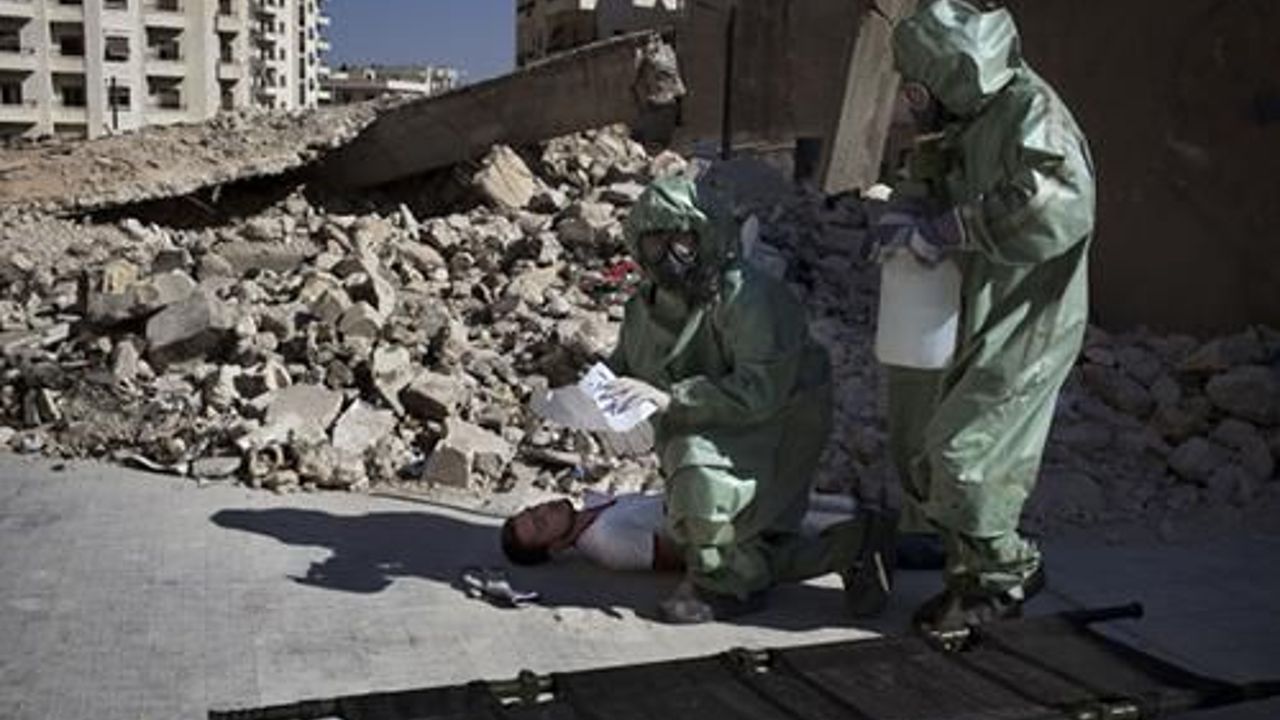Syrian regime using chlorine gas, says US envoy
World |
UN Security Council has reviewed 'compelling' evidence of chlorine gas use by Syrian regime, says U.S. ambassador to UN.

Font Size:
Chemical weapons investigators have found evidence of Syrian regimes use of a toxic chemical, the U.S. ambassador to the United Nations said Tuesday.
"Thirty-two witnesses saw or heard sound of helicopters as bombs struck; 29 smelled chlorine," Samantha Power tweeted, citing an Organization for the Prohibition of Chemical Weapons fact-finding mission report.
In closed discussions, UN disarmament chief Angela Kane briefed the UN Security Council on Tuesday on the destruction of Syria's chemical weapons arsenal.
The members also reviewed the fact-finding missions third report, which, according to media reports, concluded that there was a "high degree of certainty" that chlorine gas was used against the Syrian people in three opposition-controlled villages in 2014.
The report included eyewitness accounts of helicopters dropping barrel bombs with toxic chemicals, according to Al Jazeera, which says it obtained a leaked copy of the text.
Ambassador Power said the Syrian regime was the only party who had access to helicopters in the country's ongoing civil war. The conflict has so far claimed nearly 210,000 lives, according to the UN.
"Regime must be shown it is not enough to destroy declared CW (chemical weapons); must stop dropping chemical-laden explosives on civilians," Power tweeted.
The findings appear consistent with the previous report, which said last September that chlorine was used "systematically and repeatedly" as a weapon in villages in northern Syria in early 2014.
The use of chlorine as a weapon violates the Chemical Weapons Convention, although the agent is sold legally as a common component in industry.
The German army initiated modern chemical warfare by dispersing more than 160 tons of chlorine at Ypres, Belgium, during the World War I, killing 5,000 French and Algerian soldiers. Germanys use of gas and mustard was soon countered by similar tactics from the then Allied forces.
A deal was reached in 2013 to destroy Syria's chemical weapons stockpile after hundreds of people died in a Sarin rocket attack in a Damascus suburb in August that year.
An international mission overseen by the Organization for the Prohibition of Chemical Weapons hopes to get rid of all remaining chemical production facilities by June.
Anadolu Agency
"Thirty-two witnesses saw or heard sound of helicopters as bombs struck; 29 smelled chlorine," Samantha Power tweeted, citing an Organization for the Prohibition of Chemical Weapons fact-finding mission report.
In closed discussions, UN disarmament chief Angela Kane briefed the UN Security Council on Tuesday on the destruction of Syria's chemical weapons arsenal.
The members also reviewed the fact-finding missions third report, which, according to media reports, concluded that there was a "high degree of certainty" that chlorine gas was used against the Syrian people in three opposition-controlled villages in 2014.
The report included eyewitness accounts of helicopters dropping barrel bombs with toxic chemicals, according to Al Jazeera, which says it obtained a leaked copy of the text.
Ambassador Power said the Syrian regime was the only party who had access to helicopters in the country's ongoing civil war. The conflict has so far claimed nearly 210,000 lives, according to the UN.
"Regime must be shown it is not enough to destroy declared CW (chemical weapons); must stop dropping chemical-laden explosives on civilians," Power tweeted.
The findings appear consistent with the previous report, which said last September that chlorine was used "systematically and repeatedly" as a weapon in villages in northern Syria in early 2014.
The use of chlorine as a weapon violates the Chemical Weapons Convention, although the agent is sold legally as a common component in industry.
The German army initiated modern chemical warfare by dispersing more than 160 tons of chlorine at Ypres, Belgium, during the World War I, killing 5,000 French and Algerian soldiers. Germanys use of gas and mustard was soon countered by similar tactics from the then Allied forces.
A deal was reached in 2013 to destroy Syria's chemical weapons stockpile after hundreds of people died in a Sarin rocket attack in a Damascus suburb in August that year.
An international mission overseen by the Organization for the Prohibition of Chemical Weapons hopes to get rid of all remaining chemical production facilities by June.
Anadolu Agency
Similar News
Video News

WORLD
26 Mart 2024 - 11:18
Photo News






